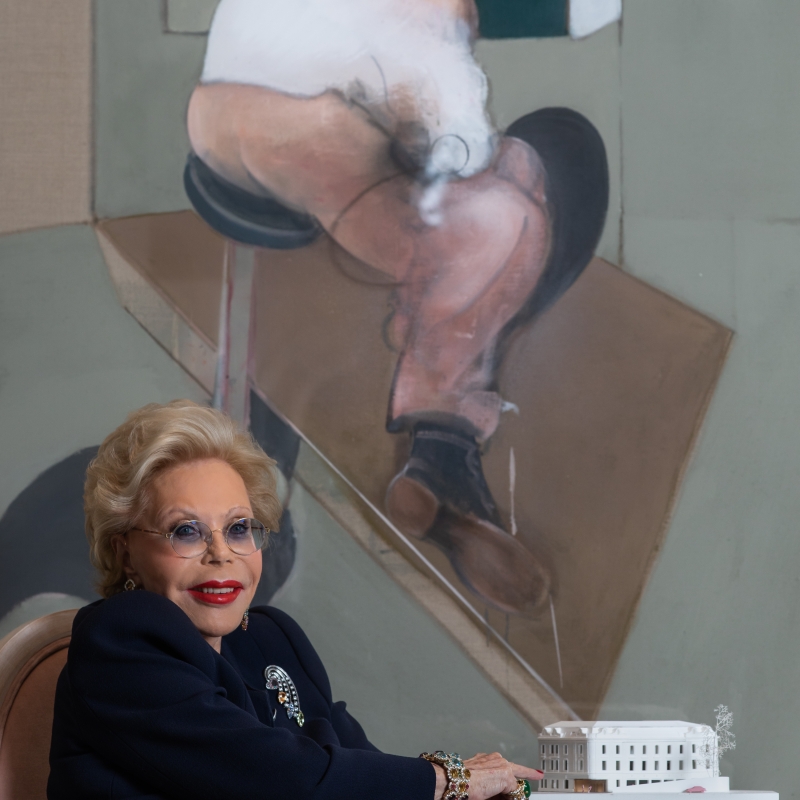
Photo: Ouriel Morgensztern © Heidi Horten Collection
“I am proud, with my collection and the construction of the museum, to have created something lasting, which future generations will also be able to experience when they visit my museum and take joy in the art that has given me such joy for so long.”
Heidi Goëss-Horten
History
Heidi Goëss-Horten (1941–2022), the museum’s founder, was a beneficiary of the estate of her first husband, Helmut Horten. They were married from 1966 until his death in 1987.
In 2019, while planning the Heidi Horten Collection, Heidi Goëss-Horten commissioned Prof. Dr. Peter Hoeres, a German contemporary historian, to conduct a scholarly examination of the early business activities of Helmut Horten. The results were published in 2022 as an expert report and in 2024 as a comprehensive, externally peer-reviewed book coauthored with Maximilian Kutzner.
Between 1936 and 1939, Helmut Horten acquired a number of department stores that had previously been owned by entrepreneurs of Jewish origin, consciously exploiting the politically induced state of distress of their former owners. He also held interests in two armaments companies, served as managing director of these firms, and, in that capacity, condoned the use of forced laborers.
Helmut Horten benefited from the specific conditions of the National Socialist regime of systematic injustice and derived financial gain from them. His business activities during these years laid the economic foundation for the later growth of the Horten Group, which amassed assets amounting to billions in postwar Germany during the 1950s and 1960s.
Following Helmut Horten’s death, Heidi Goëss-Horten developed a keen interest in art and, from the 1990s onward, assembled what is now one of Europe’s most significant art collections. In 2022, the Heidi Horten Collection, which she founded, opened to the public, thereby making her collection permanently accessible.
Present
The Heidi Horten Collection acknowledges that the wealth used to build the collection, although generated in the post-war period, rests on foundations created prior to 1945. We believe an open and transparent presentation of this historical fact is necessary and part of our responsibility, since museums are central pillars of an open society and places of knowledge, education, and public discourse.
Through our exhibitions and activities, we seek to take on responsibility for an open, inclusive, and democratic society. Our program is directed at a broad, diverse public, and we raise our voices in support of freedom, democracy, tolerance, and diversity. In this spirit, we place particular emphasis on inclusive programs that encourage cultural participation for people from diverse backgrounds and across all segments of society, while also opening new opportunities for engagement, including our wide range of free programs for students.
Historical Responsibility
The Heidi Horten Collection – explained in Easy Language
The Heidi Horten Collection is an art museum in Vienna, Austria.
The museum opened in June 2022.
It was founded by Heidi Goëss-Horten.
She lived from 1941 to 2022.
She wanted all people to see her art collection.
That is why the museum was opened.
Who was Helmut Horten?
Heidi Goëss-Horten was married to Helmut Horten.
He was her first husband.
Helmut Horten died in 1987.
He was a very rich man.
Heidi got part of his money after his death.
She used this money to buy many works of art.
Why is Helmut Horten’s story difficult?
Helmut Horten earned a lot of money during the time of National Socialism (1933–1945).
Between 1936 and 1939, he bought many department stores.
These stores were taken away from Jewish people.
This was very wrong and unfair.
The Jewish owners were in great danger and had to sell their stores.
They were forced to sell because they were Jewish.
Helmut Horten also traded weapons.
These weapons were made with forced labour.
The workers had to work under terrible conditions.
Helmut Horten became rich from these things.
Later, he became even richer.
What has been researched?
For a long time, people did not look closely at how Helmut Horten made his money.
In 2019, Heidi Goëss-Horten asked a historian to do research.
His name is Prof. Dr. Peter Hoeres.
He works at the University of Würzburg in Germany.
He wrote a report with another historian.
The report explains:
→ How Helmut Horten made his fortune
→ What happened during the Nazi era
→ Why this history must be seen critically
The report was published in 2022.
It can be read on the website of the Helmut Horten Foundation.
This foundation is based in Agno, Switzerland.
How does the museum deal with this history?
The Heidi Horten Collection is not part of the Helmut Horten Foundation.
It is legally and financially independent.
But the museum knows:
The name Horten is connected to a difficult history.
The museum says:
We should have spoken about this history earlier.
We did not.
We are sorry for that.
Now we want to speak about the past in an open and honest way.
This is our responsibility.
It is also important for our work as a museum.
What is the museum’s goal?
The museum stands for these values:
• Freedom
• Democracy
• Tolerance
• Diversity
The museum wants everyone to learn something.
That is why there are special programmes for many different people.
For example:
→ For school classes
→ For people with little money
→ For people who do not often visit museums
The museum wants to:
→ Show the past
→ Talk about the present
→ Help shape the future
Why are museums important?
Museums are places to learn.
Museums can help make society open and free.
The Heidi Horten Collection wants to be a good example – especially because of its special history.

